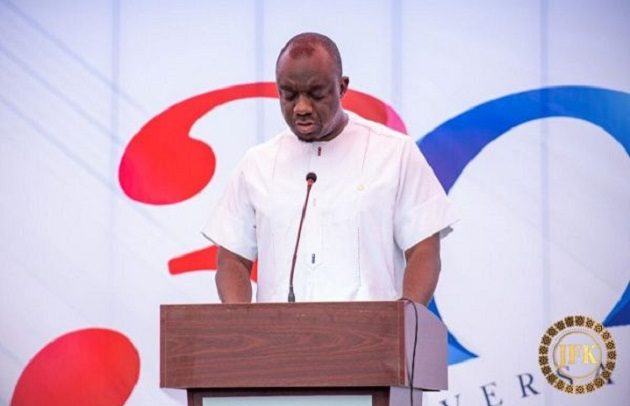Justin Frimpong Kodua
The New Patriotic Party (NPP) has taken a decision to uphold the decentralized voting procedure for the upcoming Presidential primary, DGN Online can report.
The party’s choice aligns with the methodology implemented in 2014, under the guidance of Kwabena Agyepong, the former General Secretary.
Nine of the ten presidential aspirants excluding the frontrunner, Vice President Dr Mahamudu Bawumia had petitioned the party leadership to reconsider the decentralised voting system for the super delegates conference.
The super delegates conference will prune down the list from ten to five aspirants for the main conference to elect a flagbearer in November 2023.
Following careful deliberation, the NPP leadership concluded that there were no compelling reasons to deviate from a system that proved successful in 2014.
This decentralized voting procedure garnered praise from various party figures at the time, including Kwabena Agyepong and prominent Presidential aspirants like Alan Kyerematen, Joe Ghatey, Dr. Kofi Konadu Apraku, and Francis Adai Nimo.
By maintaining the decentralized voting approach, the NPP aims to ensure transparency, inclusivity, and broad participation among party members in the selection of their Presidential candidate.
Under this system, voting will take place across multiple locations, allowing party members from various regions to engage in the democratic process.
The decision to retain the decentralized voting procedure demonstrates the party’s commitment to upholding its previous successes and the democratic principles upon which it was founded.
The NPP believes that by offering every member the opportunity to cast their vote, it will foster enthusiasm and unity within its ranks.
Party officials emphasized the importance of adhering to a tried-and-tested approach, highlighting the positive feedback received during the 2014 Presidential primary. They lauded the decentralized voting procedure for its ability to accommodate a diverse range of opinions and provide a fair representation of the party’s collective will.
In light of this decision, the NPP will now shift its focus towards organizing the logistics necessary to facilitate the primary election.
The party’s leadership has expressed confidence that the decentralized voting procedure will once again deliver a successful and well-received outcome.
As the NPP prepares for the upcoming Presidential primary, party members and supporters eagerly anticipate the opportunity to participate in this crucial democratic process.
The stage is now set for a spirited contest as candidates vie for the NPP’s coveted Presidential nomination, with the decentralized voting procedure poised to play a central role in shaping the outcome.
By Vincent Kubi


